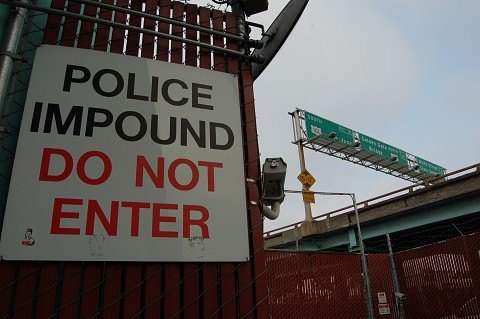Oregon Appeals Court Overturns Car Impound On Driver Property
Unlike a Texas appellate court, the Oregon Court of Appeals ruled last Wednesday that reaching one’s own driveway during a traffic stop can avoid more serious consequences. In November 2007, Officer Blood of the Cornelius Police Department attempted to stop Richard Chaves Gonzales for a traffic violation. Gonzales was just two or three blocks from home, so he did not stop until he reached his own driveway. Blood wrote Gonzales a ticket for driving on a suspended license and began searching the car without a warrant after declaring that he was going to impound the vehicle. Blood insisted that the search was valid.
“I get a slow response from people who may be suspended or not have insurance, because they want to get to what I call home base,” Blood explained at trial. “They think their car won’t get impounded if they get caught.”
State prosecutors argued that the community caretaking doctrine required that police grab the car from the driveway because the vehicle would otherwise have been “at the disposal” of people who had no license, even though the mother-in-law of Gonzales, the car’s owner, had a license. The public defender argued on behalf of Gonzales that the state had no business towing a car that was not blocking traffic and would not be considered abandoned if left alone. A trial judge decided that he was not going to allow Gonzales to benefit from not pulling over immediately.
The state court of appeals examined this decision in light of a decision from the federal appeals court that has jurisdiction over Oregon. The Ninth Circuit ruled in 2005 that police could not tow a Ford Aerostar minivan out of the owner’s driveway by asserting the community caretaking function ( view Miranda v. City of Cornelius decision).
“Defendant in this case relies heavily on Miranda, essentially urging us to adopt the Ninth Circuit’s reasoning,” Judge Ellen F. Rosenblum wrote for the three-judge panel. “We agree with the Ninth Circuit’s reasoning in Miranda and need not restate it at length here. The community caretaking doctrine does not encompass all police activity that furthers the interests of public safety, as the state appears to assert… To the extent that deterring unlicensed drivers from using the roads can be viewed as a public safety matter independent of law enforcement, we reject the state’s suggestion that leaving the car accessible to defendant would have created a threat to public safety. That contention amounts to little more than speculation that defendant would have driven the car again and would not have been deterred by the citation for driving while suspended, which carried a fine of up to $720.”
Because the court ruled the seizure was illegal, the evidence of cocaine possession obtained after conducting a search of the car was thrown out.
A copy of the decision is available at the source link below.
Oregon v. Gonzales (Court of Appeals, State of Oregon, 8/3/2010)
[Courtesy: Thenewspaper.com]
More by The Newspaper
Latest Car Reviews
Read moreLatest Product Reviews
Read moreRecent Comments
- Jrhurren Worked in Detroit 18 years, live 20 minutes away. Ren Cen is a gem, but a very terrible design inside. I’m surprised GM stuck it out as long as they did there.
- Carson D I thought that this was going to be a comparison of BFGoodrich's different truck tires.
- Tassos Jong-iL North Korea is saving pokemon cards and amibos to buy GM in 10 years, we hope.
- Formula m Same as Ford, withholding billions in development because they want to rearrange the furniture.
- EV-Guy I would care more about the Detroit downtown core. Who else would possibly be able to occupy this space? GM bought this complex - correct? If they can't fill it, how do they find tenants that can? Is the plan to just tear it down and sell to developers?


































Comments
Join the conversation
I'm glad justice was done. The powers given to the police really need to be curbed, ir at least enforced. Too often the cops think they are above the law (which they effectively are) and do whatever the hell they please. I'm ok with the occasional criminal getting away rather than have the police make a travesty of the law.
Who wrote this article? The Texas case mentioned in the first line, Banda v. Texas, never had a traffic stop. Meaning the first statement out of the gate is patently false. In Banda, Dude drove someone off the road and was tossing beer cans out his car on his way home. Only once he was already home did the cops show up and arrested him for DUI. No flashy lights, no woo-woo, no pull over. So when you nearly kill someone with your car, no, you don't get to "avoid more serious consequences" by driving home. In Texas or any other state. If you are going to write (I know TTAC didn't write this article) about the law and legal cases, read the damn things. This is just sloppy. However, I have to say I'm really glad the courts are closing the backdoor on 4th Amendment jurisprudence and vehicles. For too long the courts have allowed the police claim safety concerns and the lack of a reasonable expectation of privacy in traffic stops to utterly neuter the 4th Amendment. Before it was like trying to use a colander to hold water, but now it looks like the free pass to vehicles is over. Hopefully this will curb somewhat the rampant abuse of traffic laws to go on fishing expeditions in people's cars. Or generate revenue for the city.